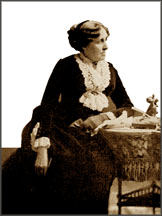Author of much - loved novels
I
n
t
h
e
l
i
m
e
l
i
g
h
t |
Some
of you may have read and studied the book Little Women as one of the
subjects during your English Literature classes. The name Louisa May
Alcott may not be all that unfamiliar to those of you who have read this
beautiful story. Little Women was Alcott's most famous novel, but by no
means her only contribution to the world of literature.
The American novelist was born on November 29, 1832. Her father was
Amos Bronson Alcott while her mother was Abigail May Alcott. She was
born in Germantown, which is currently part of Philadelphia,
Pennsylvania. She had three sisters: one elder (Anna Alcott Pratt) and
two younger (Elizabeth Sewall Alcott and Abigail May Alcott Nieriker).
The family moved to Boston in 1834/1835.
Alcott's early education included lessons from the naturalist Henry
David Thoreau, but was primarily in the hands of her father. She also
received instructions from writers and educators such as Ralph Waldo
Emerson, Nathaniel Hawthorne and Margaret Fuller, who were all family
friends.
As the family was going through severe hardship and poverty, Alcott
began work at an early age as an occasional teacher, seamstress,
governess, domestic helper and writer. Her first book was Flower Fables
(1854), tales originally written for Ellen Emerson, daughter of Ralph
Waldo Emerson. In 1860, Alcott began writing for the Atlantic Monthly.
She was nurse in the Union Hospital at Georgetown, D.C., for six weeks
in 1862-1863.
 Her letters home, revised and published in the Commonwealth and
collected as Hospital Sketches (1863, republished with additions in
1869), brought her recognition for her observations and humor. Her novel
Moods (1864), based on her own experience, was also promising. Her letters home, revised and published in the Commonwealth and
collected as Hospital Sketches (1863, republished with additions in
1869), brought her recognition for her observations and humor. Her novel
Moods (1864), based on her own experience, was also promising.
She also wrote wholesome stories for children with some advice weaved
in.Alcott found success with the appearance of the first part of Little
Women: or Meg, Jo, Beth and Amy, (1868) a semi-autobiographical account
of her childhood years with her sisters in Concord, Massachusetts.
Part two, or Part Second, also known as Good Wives, (1869) followed
the sisters into adulthood and their respective marriages. Little Men
(1871) detailed Jo's life at the Plumfield School that she founded with
her husband Professor Bhaer at the conclusion of Part Two of Little
Women. Jo's Boys (1886) completed the "March Family Saga."
Most of her later volumes, An Old-Fashioned Girl (1870), Aunt Jo's
Scrap Bag (1871-1879), Eight Cousins and its sequel Rose in Bloom
(1876), and others, followed in the footsteps of Little Women, remaining
popular with her large and loyal fan base.
In 1879 her younger sister, May, died. Alcott took in May's daughter,
Louisa May Nieriker, who was two years old. The baby's name as well as
nickname 'Lulu' were given after her aunt.
In her later life, Alcott became an advocate of women's suffrage (the
right for women to vote) and was the first woman to register to vote in
Concord, Massachusetts in a school board election.
Despite failing health, Alcott continued to write throughout her
life, finally falling victim to the after-effects of mercury poisoning
contracted during her American Civil War service. She died in Boston on
March 6, 1888 at the age of 55.
Selected works
The Inheritance (1849, unpublished until 1997)
Flower Fables (1854)
Hospital Sketches (1863)
The Rose Family: A Fairy Tale (1864)
Moods (1865, revised 1882)
Morning-Glories and Other Stories (1867)
The Mysterious Key and What It Opened (1867)
Little Women or Meg, Jo, Beth and Amy (1868)
Three Proverb Stories (includes "Kitty's Class Day," "Aunt Kipp," and "Psyche'sArt")
(1868)
Part Second of Little Women, also known as "Good Wives" (1869)
An Old Fashioned Girl (1870)
Aunt Jo's Scrap-Bag (1872-1882)
Little Men: Life at Plumfield with Jo's Boys (1871)
Work: A Story of Experience (1872)
Eight Cousins or The Aunt-Hill (1875)
Beginning Again, Being a Continuation of Work (1875)
Silver Pitchers, and Independence: A Centennial Love Story (1876)
Rose in Bloom: A Sequel to Eight Cousins (1876)
Under the Lilacs (1878)
Jack and Jill: A Village Story (1880)
Jo's Boys and How They Turned Out: A Sequel to "Little Men" (1886)
Lulu's Library (1886-1889)
A Garland for Girls (1888)
Comic Tragedies (1893)
Written as A.M.Barnard
Behind a Mask, or a Woman's Power (1866)
The Abbot's Ghost, or Maurice Treherne's Temptation (1867)
A Long Fatal Love Chase (1866 - first published 1995)
First published anonymously
A Modern Mephistopheles (1877)
|
